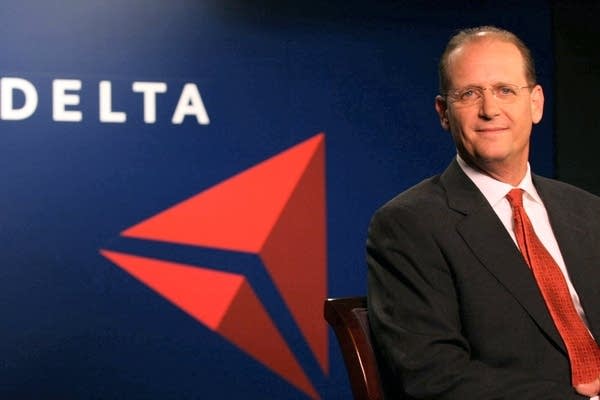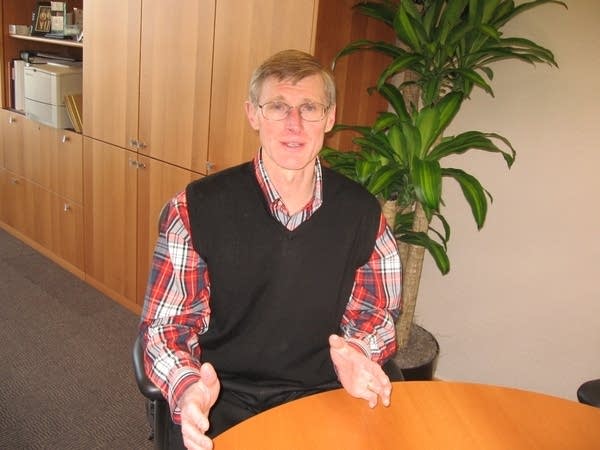Anderson at center of merger decision
Go Deeper.
Create an account or log in to save stories.
Like this?
Thanks for liking this story! We have added it to a list of your favorite stories.

Richard Anderson appears to have many qualities you would expect from an airline executive.
People who have worked with him praise his sharpness and deep knowledge of the minutiae of airline technical operations and labor issues. They call him a brilliant strategist. And they note his legal cunning.
Anderson was a prosecutor before joining first Continental Airlines and then Northwest Airlines, where he rose to the top job.

But Anderson has some qualities that have taken some people off guard. For example, he can be easy to work with-- even conciliatory. This has stunned people. In a good way.
Turn Up Your Support
MPR News helps you turn down the noise and build shared understanding. Turn up your support for this public resource and keep trusted journalism accessible to all.
"I think everyone anticipated I was going to have a very poor relationship with him. But surprisingly the opposite turned out to be the case," says Danny Campbell, who was president of Northwest Airlines flight attendant's union when Anderson began his tenure as CEO.
As Campbell recalls, Anderson took the helm right after a protracted flight attendant contract battle; Campbell worried that fight would set the tone for his dealings with Anderson. Plus, there was another potential tension.
Campbell was unhappy about some agreements his predecessor had signed with Northwest; he thought they would undermine the union. He told Anderson the test of their working relationship would be whether the agreements were allowed to stand.
"And he immediately disbanded them, right there on the spot, and I was a little shocked that he did that," Campbell says. "It almost appeared that he was undermining his own lawyers in the labor relations department who had been fighting me on this for months. So it sticks out in my mind that he really recognized that working with us was going to be very important for him."
You'll hear a similar story from former Northwest executive Jim Mathews. Anderson was chief operating officer of Northwest when Mathews met him. Mathews headed up the accounting department. He didn't expect his first encounter with Anderson to go well. They were meeting to discuss how to account for certain expenses.
"I think everyone anticipated I was going to have a very poor relationship with him. But surprisingly, the opposite turned out to be the case."
"I walked into that meeting fearing that I was going to be run over by his strong desire to get an answer that made the business look better, even if it was not the right answer by accounting standards and the way we were to report the results of the business," he explains.
But Anderson totally surprised him.
"He looked across the table and said 'How are we supposed to do this?'" Mathews says. "And I described it to him, and he said, 'I don't care if people perceive that as not the right way to present the business, if that's the right answer, it's the one we're going to take.'"
Mathews says Anderson continued to have that attitude as CEO, making Mathews' job a lot easier, he notes.
Anderson was not available for this profile. In 2004, he left Northwest and its contentious history of labor relations. His departure came about a year before the company filed for bankruptcy. Anderson then spent about three years at Minnetonka-based UnitedHealth Group before joining Delta last fall. Delta is less unionized than Northwest and has traditionally enjoyed a more family like culture.
Some workers say that feeling has changed in recent years and they wonder how things will be under Anderson, since he hasn't been at Delta very long.
"I knew he had been CEO of Northwest. I heard good and bad things about that," says Delta ramp worker and customer service agent Bruce Church, who's involved in efforts to unionize his work group.
Church says he's looking forward to getting to know Anderson better, but right now he's feeling a bit wary. He says Anderson had promised a talk about pay increases.

In a Delta newsletter to employees dated March 3, 2008, Anderson was quoted saying, "We'll make the announcement on the amount of the 2008 pay increase by the end of the first quarter. I appreciate your patience. Just as last year, the increase will be effective the first of July."
But with fuel costs soaring, the company now says a decision on raises is on hold and Delta is offering buyouts to cut its staff by 2000 workers.
Church worries those talks about pay increases are not going to happen.
"If there has to be cutbacks, we accept that, but we don't accept promises made and then taken away," he says.
Delta pilot Mike Stark says he, too, is concerned about Anderson going back on his word--for him, it's on the merger issue.
Stark says when Anderson came on board as CEO last year, he left the impression he wasn't planning a merger.
"And it was only a few weeks after he was on the property, and he was already starting to talk about, 'Well, it looks like there's going to need to be consolidation in the industry; we want to control our destiny,'" Stark explains. "So a lot of us are looking at it like speaking with a forked tongue or out of both sides of his mouth."
Still, Stark says it's too soon to judge Anderson more broadly.
Now the spotlight's on Anderson's promise that there will be no merger unless the pilots' seniority is protected. At this point, Delta pilots say their seniority would not be safeguarded in a combination with Northwest.
But the pressure to merge remains because of investors and the industry's worsening economics. And if Anderson bows to that pressure, he could incite a costly seniority battle among the pilots and spark the anger of a powerful labor group that might feel betrayed.
Anderson's history at Northwest shows he's willing to pay attention to other people's priorities. Right now it's not clear whose priorities he'll give the most weight




